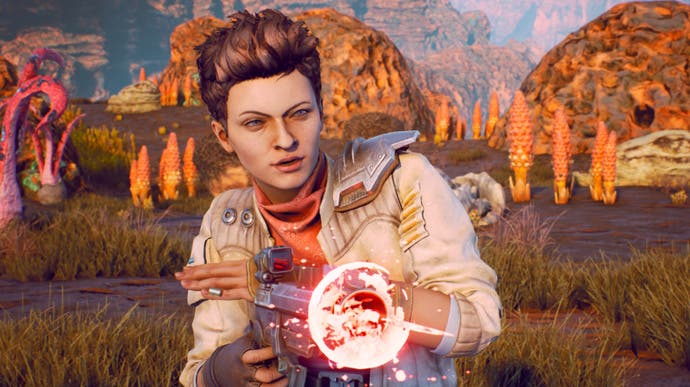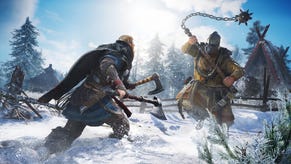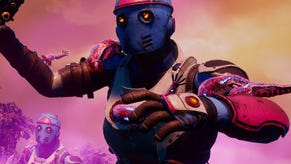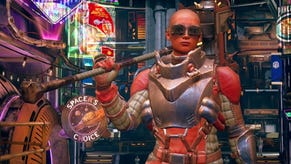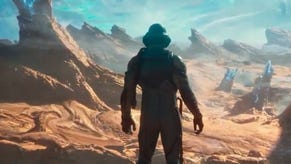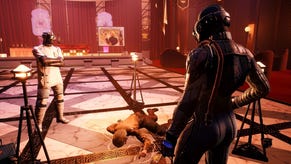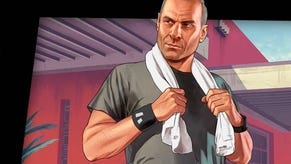As Fallout strays further from its roots, The Outer Worlds looks to fill the void
"We know a little bit about that" from work on New Vegas, Obsidian says.
"Fuck yeah we put a battle royale in Fallout 76," Bethesda co-studio director Tom Mustaine proudly proclaimed at the company's E3 conference earlier this month.
"Nuclear Winter is a battle royale born from the Fallout universe, from power armour to perk cards, from CAMP building to wasteland creatures, and of course my personal favourite, nukes," he continued, before finishing the sentence with a flourish of his hands to outline the shape of an explosion.
If you'd heard those words from the mouth of a Fallout developer back in 1997, chances are you'd be pretty darn confused. For one thing, battle royale - one of the most commercially successful game genres we've seen in years - didn't yet exist, not even in book or film form. Meanwhile, presenting nukes as an amusing and trivial thing in a Fallout game? Surely not.
While Bethesda has given a lore explanation for the battle royale, and while some will find the mode enjoyable, it can't be denied that Fallout has strayed pretty far from its roots. Instead of using dark satire to prod at big government, weapons of mass destruction and consumerism, Fallout now seems to be about following commercial trends and using nukes as a fun marketing device.
This is a process that has been going on for some time - the last mainline Fallout title to really nail the bleak-but-tongue-in-cheek feeling, in my opinion, was Fallout New Vegas. Of course, the creators of that game are now working on a brand new IP all of their own. Obsidian's The Outer Worlds may be set in the future, in space, with laser weapons and weird aliens - but New Vegas's complexity and humour is still there.
"First of all it all goes back to Fallout, me and Tim [Cain] were part of the team that created that, so there's a lot of our DNA in the very feel of a Fallout game or Fallout New Vegas, and then it's a first person RPG so very similar there," co-director Leonard Boyarsky told me during an interview at E3.
"I think Bethesda did a fantastic job translating the isometric game to first person, so we're continuing on that path," he added. "One of the things that helps us is the fact that not only did Obsidian create New Vegas, we have a lot of people who worked on New Vegas, so it's kind of a natural progression."
Boyarsky didn't go so far as to say The Outer Worlds is trying to deliberately tap into the mood of the first Fallout games, but he did allude to the idea.
"I think you'd have to ask people who actually worked on [New Vegas], but from my conversations with them, they were trying to really capture the spirit of the original Fallout with New Vegas, so we know a little bit about that."
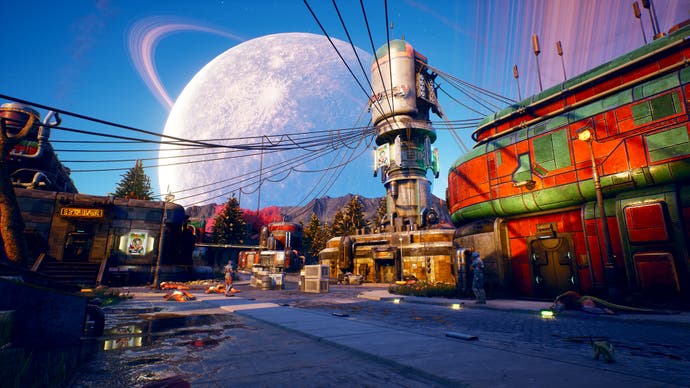
From watching the gameplay footage shown behind closed doors at E3, it's easy to trace the New Vegas influence in The Outer Worlds. Aside from the obvious gameplay similarities (such as a VATS-style targeting system called Tactical Time Dilation along with classic RPG stat checks), there's a multitude of complex and zany approaches to completing tasks - something that was demonstrated in the demo.
In a town called Fallbrook, owned by the shady Sublight Salvaging Corporation, the player can accept a quest from an NPC called Catherine to take down a slaughterhouse. As Catherine explains (in her own way) you can shoot your way in, wear a disguise, or explore other routes such as the sewers. We were shown the disguise route - but even within this, players have a variety of choices to make, like convincing a robot to leave you alone by threatening to call maintenance. ("No need for the intervention of mechanical engineers" it says, before trundling off.) Later on, hacking the factory computers gives you an option called the "pink slip protocol", which... er, doesn't end well for the employees. Think robots, laser beams and piles of ash.
Of course, the appeal isn't just the range of routes - it's also the dark humour threaded throughout the story and options. Catherine has the voice of a five-pack-a-day chain smoker and frequently comes close to breaking the fourth wall. The factory, meanwhile, keeps animals called cystipigs that grow tumours on their back which can be sloughed off as a source of "sustainable meat". Again, that sense of humour - particularly when targeted at corporations - feels rather familiar.
"I get very much into the dark stuff and social commentary and [Cain] is always very much into some sillier things, which is where the tone comes from - it's like the mix of darkness and silliness," Boyarsky said.
"Early on, [Cain] started talking about all these different brands, and he was really into the humour and silliness of all these logos and slogans, and I started talking about company towns and mining towns of the early 20th century, where the corporations owned you from cradle to grave. And we started riffing on those ideas.
"In general it's not so much a critique of pure capitalism, it's really more about people controlling the narrative - the first town you go into is a company town in the game, and it's in horrible shape, but they'll sit there and tell you how fantastic their town is, and how wonderful their corporate overlords are.
"In Fallout it was much more about governments and how they manipulated people - so it's really just about whoever has the power and how they treat people who don't have power."
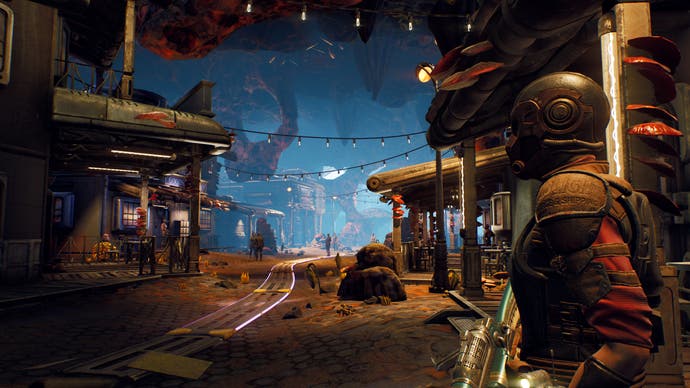
Of course, The Outer Worlds isn't just Fallout in space, and along with the corporate focus there's plenty of new gameplay additions. There's a different approach to stealth which lets players use a disguise (essentially a holographic shroud), and a "flaw system" which lets players weaken their characters in certain areas in return for a bonus perk point. Robophobia, for instance, can be acquired once the player takes a certain amount of damage from robots, and selecting the flaw will make you more susceptible to robot attacks in future.
Most noticeably, The Outer Worlds places greater emphasis on companions, giving them the ability to perform finishing moves or leave your party if they disagree with your actions. You can also create a leader type character, which comes with its own skill tree and provides you with companion perks - even if you sacrifice your own personal skills to do so.
I asked Boyarsky if this was a deliberate move away from the lone wanderer atmosphere of New Vegas towards a more team-oriented feel.
"A little bit, we really like the feel of Firefly where you have a crew. That's one of the things we wanted from this game, but we also let you be a lone wanderer if you want. We just felt they'd be more interesting characters if they were more involved with the story, if they reacted to what was going on, and they had their own quests that changed who they were as companions."
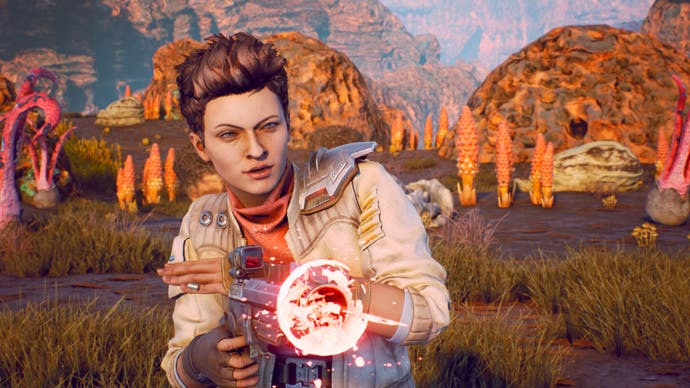
All this variety and choice comes at a price, however. Obsidian has garnered something of a reputation for brilliant but janky games, to the extent design director Josh Sawyer recently cited tight publisher deadlines as one of the reasons for lack of polish. After watching the trailers and demos, fans have already raised concerns about The Outer Worlds' gunplay for looking a little loose, and the facial animations for looking a little off.
I voiced both of these concerns to Boyarsky.
"We want it to feel good, but keep in mind some of the games they're comparing [the gunplay] to... that's the main thing about those games, they spend a lot of their time making sure that that's done correctly," Boyarsky told me. "We're spending a lot of time on ours as well, but we're also spending a lot of time on our dialogue, on the different paths you can take through the game. We don't set up very scripted encounters where we know you're running down this hallway and encounter things in a certain way. We're not that tightly choreographed, because we let the players go wherever they want and do whatever they want.
"We're covering this wide range of gameplay styles, and all of them have to feel good, as opposed to one very specific gameplay style - it's not 'here's five guns you can use in our entire game, and we're going to spend two years polishing each of those five guns'. You're switching guns all the time, you have two-handed melee weapons and one-handed melee weapons, there's all this variety - and to us, for an RPG like this, that's the most important aspect of it.
"It's funny, whenever we start - all the way back to Arcanum and after Fallout - we say we're going to focus on making the combat better, and every time it does get better, but because it is an RPG with everything that entails, we're never going to be able to put as much time into shooting as a pure shooter.
"Having said that, people who actually play the game really like it, and I know the people who are saying that about the shooting in the game have only seen the videos, and it's very different when you're sitting there playing it and feeling the feedback from it.
Given almost everything else about The Outer Worlds looks fantastic, I think I could live with slightly loose gunplay - and as Boyarsky mentions, we'll have to wait for a hands-on to know what it feels like for certain.
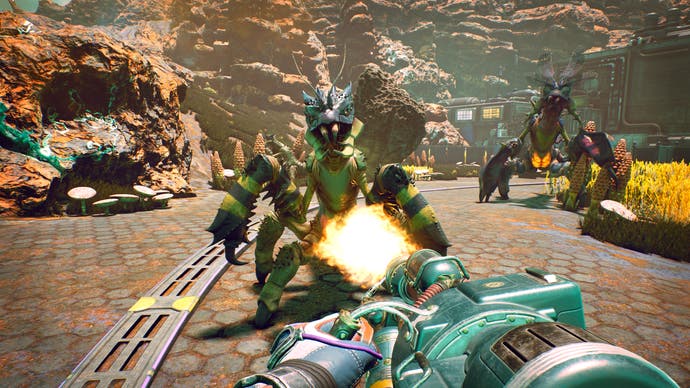
On facial animation, Boyarsky similarly said fan concerns partly stem from expectations created by large-scale, big budget games.
"We are using this time right now to do things like that and touch up those animations. We made a determination early on not to do facial capture, which once again had to do with our budget and our time.
"People are getting used to seeing full motion capture, so who knows what will happen in the future, but right now that was one of the choices we made, and I think we have some really good stuff, but if you put that up against fully facial captured animation it's never going to be as good. But we have some great animators, so hopefully people will enjoy what we do ship with."
I then asked Boyarsky if he thought jank was part of the Obsidian charm, and whether The Outer Worlds would avoid the publisher deadline issues the studio has experienced in the past.
"I don't know if it's part of the charm, but it comes with the territory," Boyarsky explained. "I think if you look at any game - not just ours - that has so much reactivity I think there's a little bit of that in there because, like I was saying before, it's really not possible to test every permutation. We're leaving it so wide open for what you choose to do.
"No matter how many people we have playtesting it, the day it goes out, ten or twenty times that many are going to be playing the game immediately, and they're inevitably going to find stuff we've missed.
"[The Outer Worlds] has been going really good, obviously when we're making a game it's smaller budget than some other games that are like this, and with a more restricted timetable, so that is a concern, but we've very much tried to keep our scope in mind with an eye towards being able to finish it and polish it. It's very difficult.
"We're doing our best to polish those rough edges, so I hope if there is some jankiness left that people do find it charming!"
On a separate question concerning pacifist runs, Boyarsky gave me an example of Obsidian's cautious and scope-aware planning for The Outer Worlds. To avoid potentially opening up the game to further bugs and jank, the decision was made to remove the pacifist path.
"We had weapons that would knock people out, but that was causing us a lot of problems with how quests were progressing, and how they handled the knocked out state," Boyarsky explained. "We're trying to keep a really tight eye on scope and going 'ok, here's something that's gonna introduce something that we're gonna be knocking down these bugs from now until we ship', so as much as it pains us to maybe not have a pacifist path through, that was one of our main things we were relying on for it, so we took that out."
That's not to say it's impossible to achieve, however - apparently a QA tester has come pretty close to finishing the game as a pacifist. To be honest, that already sounds like an interesting speedrun category.
As for my impressions of the game so far? Even from the hands-off demo, it's clear this game is packed with brilliant dialogue, snarky humour, vibrant environments and stellar writing. The quest shown was literally laugh-a-minute, and I was impressed at how it kept me totally engrossed for the entire demo. It's also refreshing to hear a major developer talk openly about social commentary in their games, at a time when so many studios are distancing themselves from the idea. And, ultimately, that dark satire is what's going to make the narrative really sing.
Turns out I'd been yearning for another first-person RPG with wacky quests for far longer than I'd realised. Fallout New Vegas always had an uncanny ability to predict the player's wishes while providing plenty of surprises, and it looks like The Outer Worlds is going to deliver this in spades. Or in space, rather.
